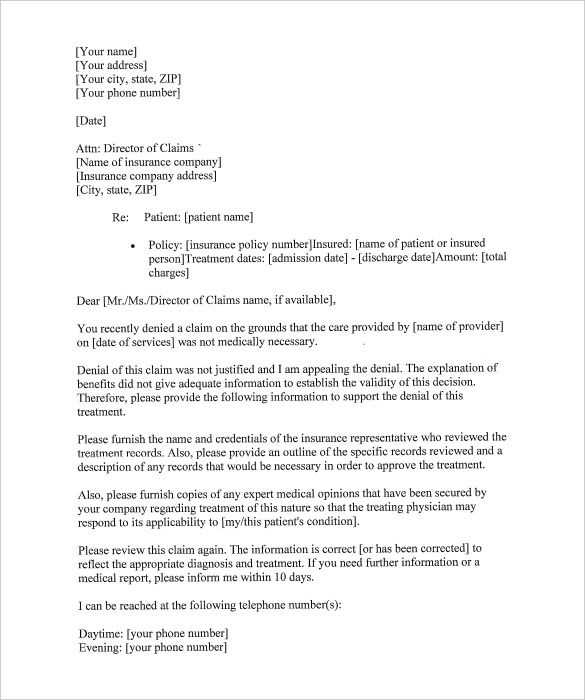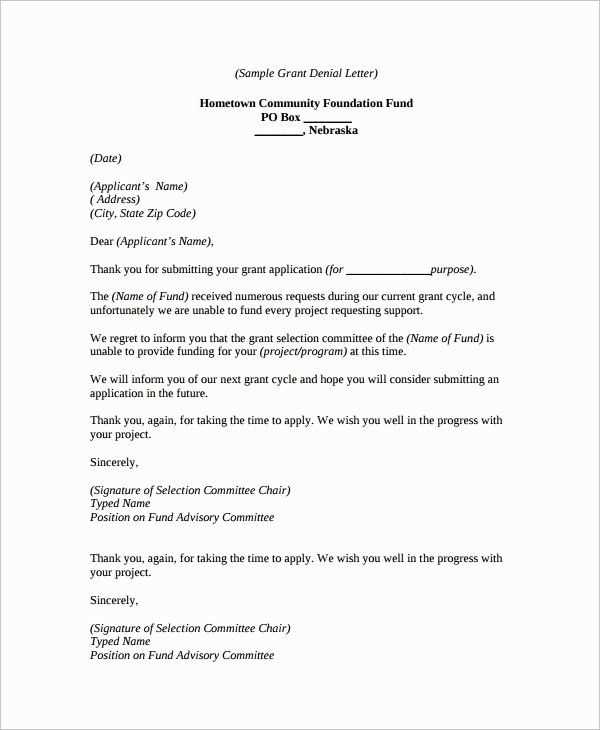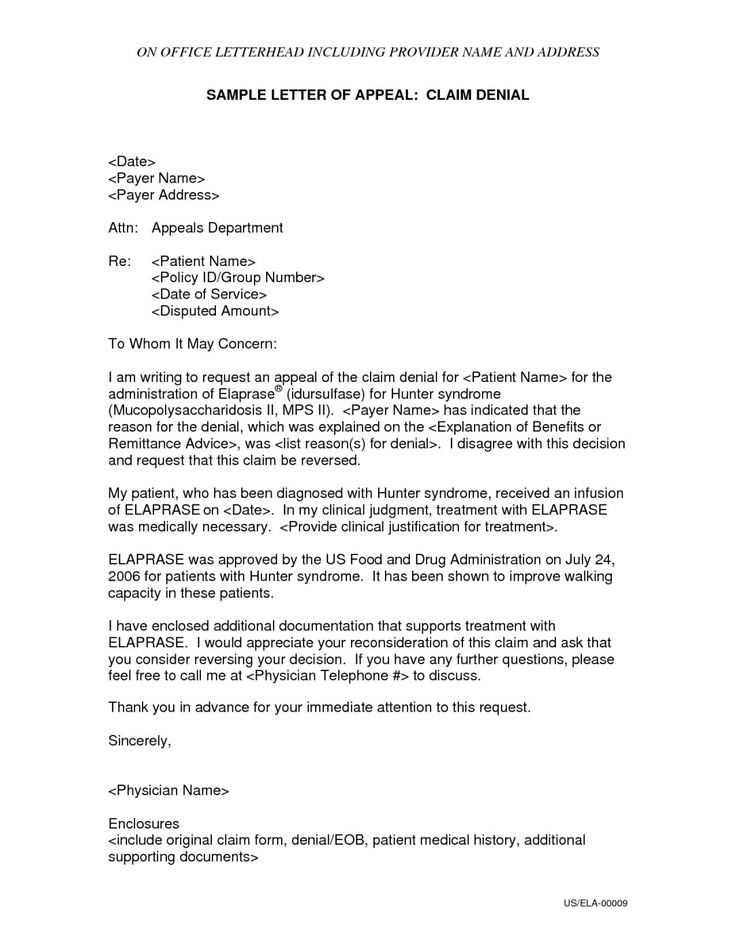Rental Application Denial Letter Template for Landlords

When managing rental properties, there may come a time when you need to inform a potential tenant that they were not selected for a unit. Communicating this decision effectively is crucial to maintain a positive reputation and avoid legal issues. While it is never easy to deliver disappointing news, doing so with respect and clarity is essential.
Crafting a respectful and clear response ensures the process is handled professionally. This can help avoid misunderstandings and ensure the applicant is treated fairly. A well-written response not only maintains a positive relationship but also demonstrates your commitment to transparency and good communication practices.
Understanding Rental Application Denials

There are several reasons why a person might not be selected for a housing opportunity. Whether due to financial constraints, personal circumstances, or a mismatch in qualifications, it’s important to understand the various factors that contribute to this decision. Recognizing these factors can help property owners make informed choices and communicate the outcome professionally.
Common Reasons for Rejection
One of the most common reasons a potential tenant may be turned down is their financial situation. If an individual cannot meet the required income level or has a history of poor credit, they might be seen as a higher risk. Other reasons for rejection include past evictions, criminal records, or failure to provide necessary documentation.
Legal Considerations in the Rejection Process
It’s crucial to avoid discriminatory practices when deciding who qualifies for a rental opportunity. Laws in many regions prohibit rejecting someone based on race, gender, or other protected characteristics. Ensuring that the decision-making process is based on objective criteria helps avoid legal complications and promotes fairness.
Reasons for Rejecting a Rental Application
When selecting tenants for a property, there are multiple factors to consider. These factors often relate to the individual’s ability to meet financial obligations, their history as a tenant, or their compatibility with the property’s requirements. Understanding the specific reasons for rejection can help landlords make informed decisions and maintain a fair selection process.
Financial instability is one of the most common reasons for not moving forward with an applicant. This may include insufficient income, high levels of debt, or poor credit history. Additionally, a history of evictions or criminal activity can raise concerns about reliability and security, making it less likely that a person will be approved. In some cases, incomplete or inaccurate documentation may also be a reason for rejection, as it prevents a full assessment of an applicant’s qualifications.
How to Write a Denial Letter
When communicating a negative decision to a potential tenant, it’s important to be clear, respectful, and professional. A well-crafted response should explain the reason for the rejection while maintaining a courteous tone. This ensures transparency and helps preserve a positive relationship, even when the outcome is unfavorable.
Structure and Key Elements
Begin by stating the decision in a direct but polite manner. It’s essential to briefly outline the reason for the rejection, whether it’s based on financial factors, previous rental history, or other criteria. Make sure to keep the tone neutral and avoid language that could be perceived as offensive or discriminatory.
Offering Alternatives and Final Remarks
If appropriate, consider offering guidance or alternative options. This could include suggesting other properties or encouraging the applicant to reapply in the future under different circumstances. Conclude by thanking the individual for their interest and wishing them well in their search for housing.
Essential Components of the Letter
Creating a professional response to inform someone about the rejection of their interest in a property involves including specific details. These elements ensure that the message is clear, respectful, and legally compliant. A well-organized communication can help maintain a good rapport with the individual while explaining the decision effectively.
Key Elements to Include
- Opening Statement: Clearly state that the applicant was not selected, while expressing gratitude for their interest.
- Reason for Rejection: Provide a concise and neutral explanation for the decision, based on the established criteria.
- Legal Compliance: Ensure that the language is free of discriminatory remarks and aligns with fair housing regulations.
- Closing Statement: Offer polite well wishes and encourage future communication if necessary.
Additional Considerations
- Professional Tone: Always maintain a formal and courteous tone to preserve the applicant’s dignity.
- Contact Information: Include a way for the individual to follow up if they have questions or require clarification.
Maintaining Professionalism in Rejections
When delivering unfavorable news, it’s essential to maintain a level of professionalism that reflects respect for the applicant. A rejection can be disheartening, but the way it is communicated plays a significant role in preserving a positive relationship. By choosing the right words and tone, you ensure that the process remains respectful and courteous.
Using Clear and Respectful Language

It’s important to use language that is both direct and considerate. Avoid using overly harsh or negative terms, and instead, aim for a tone that is polite and neutral. Clearly explain the reason for the decision, but do so without sounding dismissive or critical of the applicant’s situation.
Providing Constructive Feedback
If possible, offering constructive feedback can help the individual understand how they might improve their chances in the future. While this is not always necessary, when appropriate, it can create a sense of transparency and show that the decision was made based on clear and fair criteria.
Tone and Language to Use
The way rejection is communicated plays a critical role in maintaining professionalism and a positive relationship. Choosing the right tone and language ensures that the message is clear without being disrespectful or hurtful. A well-crafted message should convey the decision tactfully while remaining empathetic and courteous.
Appropriate Language Choices
Using respectful and neutral language is key to ensuring the recipient does not feel targeted or disrespected. It’s important to stay factual while avoiding any form of judgment or negative remarks. Below is a comparison of language that should be used versus what to avoid:
| Language to Use | Language to Avoid |
|---|---|
| We regret to inform you | We’re sorry, but you didn’t make the cut |
| Unfortunately, we are unable to move forward | You didn’t meet the requirements |
| Thank you for your interest and time | We didn’t find you suitable |
Maintaining a Neutral Tone

When explaining the decision, a neutral tone is important. The message should avoid sounding accusatory or blaming the applicant. Instead, focus on the objective criteria that led to the decision, keeping it factual and professional.
Legal Considerations When Denying an Application
When making a decision to reject a potential tenant, it’s crucial to be mindful of the legal aspects involved. Ensuring that the rejection complies with applicable laws helps protect both the landlord and the applicant from any potential legal issues. Understanding key regulations can help avoid claims of discrimination and ensure fairness in the process.
Key Legal Guidelines
- Fair Housing Laws: Be aware of federal, state, and local laws that prohibit discrimination based on race, color, religion, gender, national origin, disability, or familial status. Rejecting an applicant for any of these reasons is illegal.
- Consistency in Criteria: Use consistent criteria for all applicants. Inconsistent treatment can lead to claims of discrimination or unfair practices.
- Written Notification: It’s important to provide written communication to the applicant explaining the decision. While not always legally required, it helps maintain transparency and demonstrates professionalism.
Avoiding Legal Risks

- Document Everything: Keep detailed records of the decision-making process, including the reasons for rejection. This can protect you in case of a dispute.
- Avoiding Bias: Ensure that personal biases do not influence the decision. Focus on objective factors like financial stability and rental history.
- Providing Fair Access: Make sure that your property is accessible to everyone, and avoid setting policies or practices that disproportionately affect any protected group.
Avoiding Discrimination and Bias

When making decisions about potential tenants, it’s crucial to maintain fairness and impartiality. Personal preferences or unconscious biases must not influence the evaluation process. Adhering to legal standards and promoting equal opportunities for all applicants is essential to avoid discrimination claims and to create an inclusive and professional environment.
To avoid unfair treatment, it’s important to focus on clear, objective criteria and apply them consistently to all applicants. Below is a comparison of what is acceptable and what should be avoided in tenant selection practices:
| Acceptable Practices | Practices to Avoid |
|---|---|
| Evaluating applicants based on financial stability, background checks, and rental history. | Rejecting candidates based on race, gender, or family status. |
| Ensuring equal access to housing for individuals of all backgrounds and characteristics. | Making decisions based on stereotypes or personal biases. |
| Offering clear, non-discriminatory criteria for selection that apply to all applicants equally. | Setting criteria that unintentionally disadvantage a protected group. |
By implementing unbiased and consistent policies, you can reduce the risk of discrimination while ensuring a fair and legal tenant selection process.